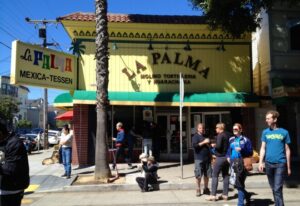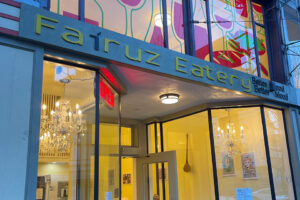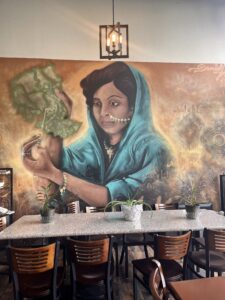On December 15, 2023, infamous TikTok food blogger Keith Lee began his highly-anticipated visit to the Bay Area. Three days into his visit, Lee suddenly announced his departure. “The people of the Bay are just focused on surviving,” he said. His comments reignited a national debate and raised the question: is the food culture in the Bay Area on the decline? Rather than feed into narratives of urban disrepair and community decline, I strongly believe there are places in the Bay Area that Lee should have stayed for.
Lee, a former MMA fighter from Detroit, has built up a national following for his blunt, plainspoken food review videos of largely unknown, mostly BIPOC-owned family-run businesses. This trip followed his classic format, reviewing his food in his car for millions of audience members worldwide. However, the visit didn’t go as many Bay Area natives anticipated.
Lee quickly announced he was leaving the Bay Area, posting a video on his TikTok page that currently has nearly six million views. In the video, he cited the three main reasons for his early exit: lackluster food, an allergic reaction and general shock and dismay at the living conditions he observed as he traveled to various restaurants. “I don’t believe the Bay is fit for tourism at the moment,” Lee said in the video.
Viewers, particularly natives of the Bay, were split. Oakland lyricist Tajai from the Mighty Souls of Mischief agreed with Lee. “This is not to be a doomsayer or be negative about the Bay, but I think we’ve gotten used to some stuff, y’all, that is not normal,” he said. Dr. Ameer Hasan Loggins, a postdoctoral scholar at Stanford University, said “some of y’all are focused on the food when Lee was focused on the effects of structural inequality.”
As a San Francisco native with deep Bay Area loyalties, I strongly believe that the only way the Bay will improve is by investing in community forces themselves. I set out to visit and interview three different restaurants (and their staff) that represent the commitment, love and spirit of true Bay Area residents– places I would have taken Lee to visit:

1. La Palma SF- 2884 24th St, San Francisco
Originally established in 1953, La Palma restaurant in the SF Mission district has grown to become a community staple. “When we started, it was just a small grocery store with probably about seven employees,” said Aida Ibarra, who co-owns La Palma with her husband Reben Ibarra. Now, the store has blossomed into a bustling cultural hub—now with over 32 employees.
“We try to cook for every Latin community that we know how to cook for, our main goal is to keep the culture and ethnic food of the Bay alive,” Aida explained. Much of La Palma’s success and longevity can be attributed to their commitment to time-honored methods of cooking and preparing food. From hand-making their tortillas, to cooking corn masa and grinding in lava stones, to sourcing all produce from local farms, La Palma emphasizes a nuclear and localized way of food preparation. The result? The restaurant is now open six days a week (the seventh day is used for cleaning), with some employees starting as early as 1am, with an estimated 6.5 million tortillas made per year. That’s 492 miles of tortillas, which, if laid side by side, could pave a road from San Francisco to Mexicali. Aida herself noted that it had been 15 years since she had taken a vacation.
La Palma’s commitment to the community has solidified its status as a local legend. It was recently voted ‘Top five best burritos in San Francisco’ by the SF Chronicle, catering to a perpetual line out the door- sometimes as long as three city blocks. Much of La Palma’s community impact can be traced back to its goal of unity. “Everyone says the kitchen is the heart of the home, and food keeps people united. Many people marry into different cultures and we learn different plates. It’s all a mix that keeps the Latin community together.”
Must try dish: Gorditas-small Mexican corn cake that is fried, baked, or grilled and stuffed with various ingredients.

2. Fairuz Eatery- 519 Columbus Ave, San Francisco
Since its opening in 2015, Fairuz Eatery has become one of the most prominent Palestinian restaurants in San Francisco. Named after the infamous Lebanese singer Fairuz, it is owned by Majjid along with his brother and their mother. “When we moved from Jordan in 2013, my brother and I saw an empty building and knew we had to fulfill my mom’s dream of owning a restaurant,” explained Majjid.
“Every dish is now made by my mom.” Family and commitment is what has held his family together.
According to the Jordanian Department of Statistics, Palestinians make up nearly 70% of the population in Jordan, many migrating to Jordan following conflicts with Israel and subsequent displacement from their homes. Amidst narratives of displacement and upheaval, food has served as a homeplace and a form of resilience.
Still, Fairuz is no stranger to business challenges, particularly in the ever-changing SF landscape. “Before the pandemic, San Francisco was a lot more lively; there were more people,” explained Majjid. Similar to numerous restaurants in the Bay Area, Fairuz experienced a closure of business due to the COVID-19 pandemic, leading to significant financial challenges.
Still, the owners of Fairuz Eatery aren’t going anywhere. “The people who live here and know the city and its people, they love San Francisco. It’s become my home, it’s my town,” said Majjid. Business is booming, and the owners have started looking towards the future. “People really love our food, especially the locals. We serve authentic food with reasonable pricing, and I think people really see that,” said Majjid.
Must try dish: Arrayes- classic street food composed of grilled pita brea grilled pita bread that is stuffed with spiced ground beef (or kofta).

3. Z Zoul SF- 295 Eddy St, San Francisco
Stepping into Z Zoul, the first thing you see is the mural on the back wall. A woman, dressed in blue, stitches a map of Sudan and South Sudan back together. For owner Aref Egali, the mural serves as a beacon of what his restaurant stands for: culture, family and most importantly, unity.
Egali, born in Sudan, grew up helping his mother cook for his seven brothers. He grew up between Sudan and Saudi Arabia, eventually traveling to India to attend college. After Egali completed his studies, he returned to Saudi Arabia and started working with a company for market research. In 2016, he moved with his four children to California, joining more family already established in the US.
Once in California, Egali’s next step was to find somewhere to work. “I immediately said, I don’t want to work for anyone else,” he said. In college, Egali used to cook for his Sudanese roommates, regularly cooking for 50-60 people each week. Drawing on that knowledge, he decided to start Z Zoul, nestled in the Tenderloin, which he now considers to be his home.
For Egali, food has always been synonymous with community. Z Zoul has grown to be a prominent Tenderloin staple– Egali serves as part of the Tenderloin Congress and serves as the president of the Tenderloin Merchants Association. He feels an incredible sense of unity with businesses in his neighborhood. “Each culture has their own taste, recipes and way of eating, but the base is always the same–rice, chicken, beef, and more.” For Egali, cultural diversification is a proponent of community building. “Unity is ultimately what our community needs– between the government and between the civil community,” he said. “This is how we all move forward.”
Must try dish: Roasted Lamb Shank– tender lamb garnished in a blend of spices.








Escort Gazette review guide with free verified ads in Europe. Best Escort Girls, Strip clubs, Brothels, Massage parlors on the map. Easy search directory. https://lorenzoaoam80356.mdkblog.com/31913128/escort-gazette-review-guide-with-free-verified-ads-in-europe
Escort Gazette review guide with free verified ads in Europe. Best Escort Girls, Strip clubs, Brothels, Massage parlors on the map. Easy search directory. https://directory-b.com/listings12688371/best-escort-girls-strip-clubs-brothels-massage-parlors-on-the-map-easy-search-directory
Escort Gazette review guide with free verified ads in Europe. Best Escort Girls, Strip clubs, Brothels, Massage parlors on the map. Easy search directory. https://minert036bmz2.ttblogs.com/profile
Escort Gazette review guide with free verified ads in Europe. Best Escort Girls, Strip clubs, Brothels, Massage parlors on the map. Easy search directory. https://jonahm702rbm7.blognody.com/profile
Escort Gazette review guide with free verified ads in Europe. Best Escort Girls, Strip clubs, Brothels, Massage parlors on the map. Easy search directory. https://bookmarkfox.com/story2352825/escort-gazette-review-guide-with-free-verified-ads-in-europe
Escort Gazette review guide with free verified ads in Europe. Best Escort Girls, Strip clubs, Brothels, Massage parlors on the map. Easy search directory. https://riverpcpc36892.fitnell.com/66898587/best-escort-girls-strip-clubs-brothels-massage-parlors-on-the-map-easy-search-directory
Escort Gazette review guide with free verified ads in Europe. Best Escort Girls, Strip clubs, Brothels, Massage parlors on the map. Easy search directory. https://randallh580nzk6.buyoutblog.com/profile
Escort Gazette review guide with free verified ads in Europe. Best Escort Girls, Strip clubs, Brothels, Massage parlors on the map. Easy search directory. https://sociallawy.com/story6868575/best-escort-girls-strip-clubs-brothels-massage-parlors-on-the-map-easy-search-directory
Escort Gazette review guide with free verified ads in Europe. Best Escort Girls, Strip clubs, Brothels, Massage parlors on the map. Easy search directory. https://ralpha357fpb3.bloggip.com/profile
Escort Gazette review guide with free verified ads in Europe. Best Escort Girls, Strip clubs, Brothels, Massage parlors on the map. Easy search directory. https://edgarsfre47924.hamachiwiki.com/635520/best_escort_girls_strip_clubs_brothels_massage_parlors_on_the_map_easy_search_directory
Escort Gazette review guide with free verified ads in Europe. Best Escort Girls, Strip clubs, Brothels, Massage parlors on the map. Easy search directory. https://seymourl813wjv1.thebindingwiki.com/user
Escort Gazette review guide with free verified ads in Europe. Best Escort Girls, Strip clubs, Brothels, Massage parlors on the map. Easy search directory. https://bookmarkforest.com/story16912997/escort-gazette-review-guide-with-free-verified-ads-in-europe
Escort Gazette review guide with free verified ads in Europe. Best Escort Girls, Strip clubs, Brothels, Massage parlors on the map. Easy search directory. https://classifylist.com/story18472747/escort-gazette-review-guide-with-free-verified-ads-in-europe
Que Es Cialis
I think, that you commit an error. Write to me in PM, we will discuss.
Cialis 5 mg prezzo tadalafil 5 mg prezzo tadalafil 5 mg prezzo
Популярные методы многофакторной аутентификации
кз впн двухфакторная аутентификация rdp .